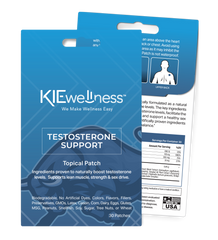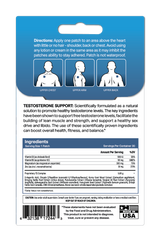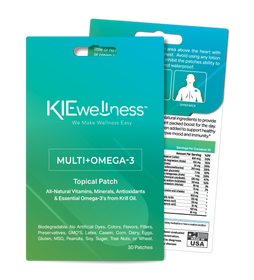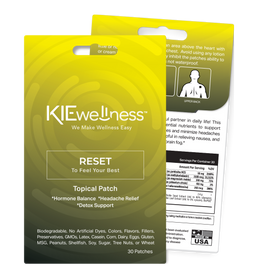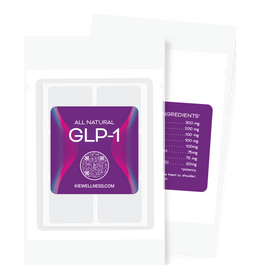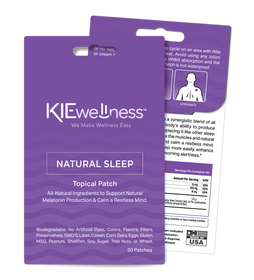Description

TESTOSTERONE SUPPORT
Scientifically formulated as a natural solution to promote healthy testosterone levels. The key ingredients have been shown to support free testosterone levels, facilitate the building of lean muscle and strength, and support a healthy sex drive and libido. The use of these scientifically proven ingredients can boost overall health, fitness, and balance.*
DIRECTIONS: Apply 1 patch to an area above the heart with little or no hair - shoulder, back or chest. Avoid using any lotion or cream in the same area as it may inhibit the patches ability to stay adhered. Patch is not waterproof.
--
INGREDIENTS:
Vitamin D3 (as cholecalciferol): Vitamin D is a fat-soluble vitamin that your body produces upon exposure to sunlight. People with limited exposure to sunlight may have low levels of vitamin D. In its active form, vitamin D functions as a steroid hormone in the body. Experts say it’s essential for male sexual function. Increasing vitamin D stores may boost testosterone and improve other related health measures, such as sperm quality. One study found a link between vitamin D deficiency and low testosterone. When participants spent more time in the summer sun, their vitamin D and testosterone levels increased. In another yearlong study, researchers split 65 men into 2 groups, one of which took 3,300 IU of vitamin D daily. The supplement group’s vitamin D levels doubled, and their testosterone levels increased by around 20%, from 10.7 nmol/L to 13.4 nmol/L.
Vitamin B6 (as pyridoxine HCI): Vitamin B6 plays a major role in processing the protein, carbs, and fats you eat. Vitamin B6 is also involved in the autonomic processes of your nervous and immune systems. Vitamin B6 helps with memory, cognitive functions, energy levels, as well as testosterone production. As important as vitamin B6 is, your body is unable to store it, so you must receive a daily dose. If you are lacking in vitamin B6, you may suffer from nervous disorders, kidney stones, acne, and even early onset memory loss. It is important to increase our intake of vitamin B6 as we get older, especially for testosterone production. Vitamin B6 influences testosterone production by increased demand for androgens. When the body lacks vitamin B6, the brain increases estrogen levels. This vitamin acts as a counterbalance for hormone regulation. It also happens to increase the serum growth hormone and lower prolactin levels.
Magnesium (as magnesium aspartate): Magnesium helps facilitate more than 300 reactions throughout the body. As a result, it is involved in a variety of processes including synthesizing proteins, optimizing muscle and nerve function, regulating blood glucose levels, and controlling blood pressure. However, recent literature shows another previously overlooked benefit: it can increase the amount testosterone in your body. Several recent studies suggest a correlation between magnesium and unbound testosterone- allowing both men and women to maximize its performance-enhancing properties. In one study 12 men received magnesium supplementation while 14 others received placebos and served as the controls. Each subject performed three sets of 10 repetitions of leg press and leg extension three times per week. As predicted, both groups experienced gains in strength as exhibited by increases muscle mass and performance. However, results indicated a significant increase in testosterone for the group taking magnesium supplementation compared to the control group. These findings suggest that magnesium may play an essential role in testosterone production and that magnesium supplementation in conjunction with resistance training increases testosterone production in men.
Zinc (as zinc L-monomethionine): Zinc is an essential trace mineral, meaning it can’t be synthesized naturally in your body. Zinc has several important functions. It is involved in gene expression, cell division, DNA replication, and cell growth. It also supports the immune system and helps wounds heal. More than 300 enzymes and more than 1,000 transcription factors rely on zinc to function. In men, zinc plays a critical role in testosterone production and overall reproductive health. Men with low zinc may also experience sexual symptoms related to hypogonadism, otherwise known as low testosterone or low T. Zinc helps transform the steroid hormone testosterone into a biologically active form (5α-dihydrotestosterone or DHT). If you aren’t getting enough zinc, your testosterone levels which already decrease with age may be low. Whatever the reason for low T, supplementing with zinc can promote healthy testosterone levels.
D-Aspartic Acid: Amino acids are molecules that have several functions in the body. They’re the building blocks of all types of protein, as well as certain hormones and neurotransmitters. Almost every amino acid can occur in two different forms. For example, aspartic acid can be found as L-aspartic acid or D-aspartic acid. The forms have the same chemical formula, but their molecular structures are mirror images of each other. Because of this, the L- and D- forms of an amino acid are often considered “left-handed” or “right-handed.” L-aspartic acid is produced in nature, including in your body, and used to build proteins. However, D-aspartic acid isn’t used to build proteins. Instead, it plays a role in making and releasing hormones in the body. D-aspartic acid can increase the release of a hormone in the brain that will ultimately result in testosterone production. It also plays a role in increasing testosterone production and release in the testicles.
Puncturevine Extract (Tribulus terrestris): Puncturevine otherwise known as Tribulus is an annual plant in the caltrop family with small woody fruit having long, sharp and strong spines. Both the root and fruit of the plant have been used medicinally in Chinese and Ayurvedic medicine to enhance athletic performance and increase libido. Tribulus is also said to raise your levels of certain hormones, including testosterone.
Stinging Nettle Root Extract (Urtica dioica): Research shows that stinging nettle root may have unique benefits for men’s sexual health and hormone regulation. The herb contains lignans (a group of chemical compounds found in plants) that are believed to help prevent the binding of sex hormone-binding globulin to testosterone. This is key because this helps ensure that free testosterone is available for effectively promoting male vitality and normal sexual function. So, the supplement does not directly increase testosterone, but rather helps the hormone properly function. Stinging nettle root extract effectively compliments potent testosterone boosting herbs tongkat ali and puncturevine.
Tongkat Ali Root Extract (Eurycoma longifolia): Tongkat ali, or longjack, is an herbal supplement that comes from the roots of the green shrub tree Eurycoma longifolia, which is native to Southeast Asia. It’s used in traditional medicine in Malaysia, Indonesia, Vietnam, and other Asian countries to treat malaria, infections, fevers, male infertility, and erectile dysfunction. Specifically, tongkat ali contains flavonoids, alkaloids, and other compounds that act as antioxidants. Antioxidants are compounds that fight cellular damage caused by molecules called free radicals. They may benefit your body in other ways as well. Tongkat ali’s potential to increase testosterone in men with low levels of this primary sex hormone is well known and well documented.
Fenugreek Seed Extract (Trigonella foenum-graecum): Fenugreek Seed Extract is an annual plant that is native to India and North Africa. Various parts of the fenugreek plant have been used in traditional medicine practices throughout history to treat a variety of ailments. Fenugreek has been researched for its potential to naturally increase testosterone. It contains compounds called furostanolic saponins, which are believed to increase testosterone production. Several studies have shown that taking fenugreek supplements may improve testosterone levels and symptoms related to low testosterone such as low libido. An 8-week study in 49 athletic men found that taking supplements with 500 mg of fenugreek daily slightly increased testosterone levels and significantly improved strength and body fat compared to a placebo group. Protodioscin is a type of saponin in fenugreek that may be particularly effective at increasing testosterone levels. A 12 week study in 50 men demonstrated that those who took a daily 500 mg fenugreek supplement that contained concentrated amounts of protodioscin experienced significant improvements in their testosterone levels. The study found that testosterone levels increased by up to 46% in an impressive 90% of the participants. What’s more, the majority of the fenugreek supplement group experienced improvements in mood, energy, libido, and sperm count.
PrimaVie® Shilajit Fulvic Acid Complex: Shilajit, also known as Mumie, Moomiyo, and Mummiyo, is found mostly in rocks of the Himalayan mountains of India and Tibet. It is formed from the slow decomposition of plants and develops over centuries. Shilajit has many medicinal properties and is used in Ayurveda medicine and is found to be beneficial against diseases, improve overall health, and produce positive effects on the body. PrimaVie® Purified Shilajit significantly increased free and total testosterone levels in healthy individuals in a new study published in Andrologia. In this randomized, double blind, placebo-controlled study, 75 healthy volunteers between the ages of 45 and 55 received either 250 mg of PrimaVie twice daily or identical placebo twice daily for 90 consecutive days. Results from the study showed that supplementation with PrimaVie® lead to a 20% increase in total testosterone levels and a 19% increase in free testosterone levels after 90 days. PrimaVie® consists of dibenzo-α-pyrones (DBPs), DBP-chromoproteins (DCPs), fulvic acid, forty different trace minerals, and it has very low levels of heavy metals.
DIM (Diindolylmethane): Diindolylmethane (DIM, in short) is the principal breakdown product of indole 3-carbinol (I3C), the phytochemical found in cruciferous vegetables like cabbage, cauliflower, broccoli, brussels sprouts, kale, collards, mustard greens, radishes, watercress, and turnips. DIM has been shown in scientific studies to reduce the risk of prostate and other hormone-driven cancers by helping the body to make a better balance of the hormones. Testosterone acts differently depending on whether it is free or bound to carrier proteins in the blood. DIM, through its effects on estrogen metabolism supports testosterone by helping to maintain the level of free or active testosterone. Free testosterone refers to diffraction of testosterone that circulates in the blood and is not associated with or bound by SHBG (Sex Hormone Binding Globulin), its carrier protein. Since DIM promotes a more active metabolism of estrogen, unmetabolized estrogen levels fall and the 2-hydroxy-estrogens increase. The 2-hydroxy-estrogens possess the unique ability to displace testosterone from SHGB and set it free. Therefore, the combined effect of DIM to reduce unmetabolized estrogen and increase 2-hydroxy-estrogens can reduce elevations in SHGB and allow for more free testosterone.





